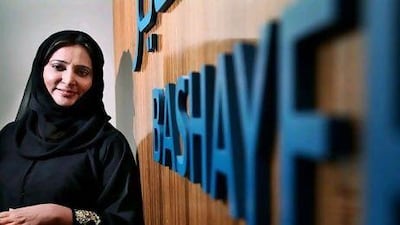Sara Mohamed is the chief executive of Al Bashayer Investment Company, a wealth management, corporate advisory and investment-banking firm with a special focus on female investors. From her offices in Abu Dhabi, Mrs Mohamed designs unique investment schemes for women while promoting their involvement in the financial world.
In your experience, do women invest differently than men?
Yes, they do; their risk-tolerance level is conservative, cautious and income-based. The needs of women are different in the sense they live longer than men. The income of divorced women drops more than 60 per cent on average, and many women are broke within a few months of their husband passing away. They also tend to have long-term investment strategies rather than short term, and prefer a more discretionary asset- management style.
Is your company planning any new investment products?
We are working on a Women Development Fund, which will generate income and contribute 1 per cent of the income to charity. We are also looking at structuring a small-to-medium-sized-business (SME) fund.
In this region, how are women taking more of a leadership role through investing and business?
In the past 20 years, Arab countries have made considerable gains, particularly in the health and education of females. Today, Arab women are not only more assertive, but play a critical role in society. Arab women attribute their success not only to a strong support system based primarily on their families, but encouragement and support from the government. This is also based on good business acumen and sound investment decisions. SMEs are a major driving force in the region and there's an acute awareness of the need to promote entrepreneurial opportunities among Arab women.
Is the role of women different in this region compared with the West?
Much more needs to be done before women in the GCC can stand on par with their sisters in the developed world. Arab women on the whole are still less economically and politically empowered than women in other parts of the world. In 2007, the percentage of UAE women on corporate boards was 0.8 per cent, for Saudi women it was 0.1 per cent, Qatar was 0.3 per cent, Oman was 2.3 per cent, Kuwait was 2.7 per cent and Bahrain was 1 per cent.
What are the biggest challenges facing women in business?
The biggest obstacle lies with women themselves. They don't believe in themselves and that they can play two roles at the same time. They need to see more success stories, so the challenges will not feel as great as they do now.
What is the solution?
Education is the basis. Education is not just about knowledge or skills, but also about good citizenship, equal rights, changing mindsets, challenging stereotypes, debating and volunteering. The challenge is for us to get our priorities right, concentrate on quality education and give women the ability to think critically for themselves. Women need to be empowered and fully integrated into the economy, education, politics and civil society. There is still fairly widespread poverty, along with low literacy rates in the region and time hardened sensitivities.

